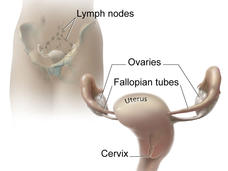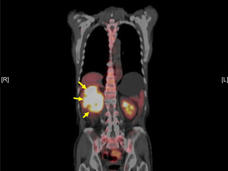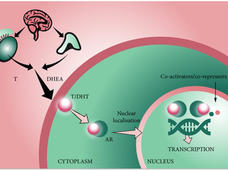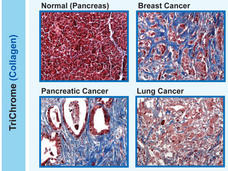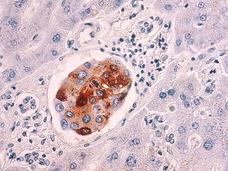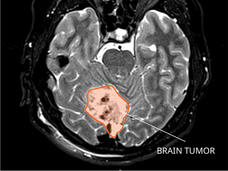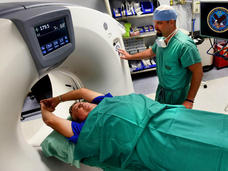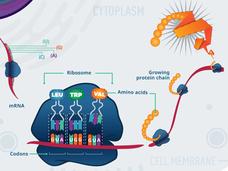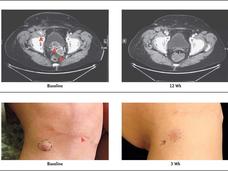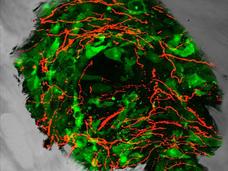Cancer Currents: An NCI Cancer Research Blog
A blog featuring news and research updates from the National Cancer Institute.
-
Trial Examines Value of Lymph Node Surgery in Advanced Ovarian Cancer
Surgery to remove all the lymph nodes in the area around an advanced ovarian tumor did not improve survival in a recent randomized clinical trial. The study also found systematic lymphadenectomy was associated with more frequent serious complications.
-
Nature’s Bounty: Revitalizing the Discovery of New Cancer Drugs from Natural Products
NCI has launched an ambitious initiative, called the NCI Program for Natural Products Discovery (NPNPD) and funded by the Cancer Moonshot℠, to make it easier for researchers to mine nature for leads on new cancer drugs.
-
Targeted Therapy–Immunotherapy Combinations Effective for Advanced Kidney Cancer
In two clinical trials, combination treatments that included an immune checkpoint inhibitor and axitinib (Inlyta) led to better outcomes for patients with advanced kidney cancer than treatment with sunitinib (Sutent), the standard initial therapy.
-
Darolutamide Delays the Spread of Some Prostate Cancers
The investigational drug darolutamide can help delay the spread of prostate cancer in some men with the disease, a recent clinical trial shows. In addition, the drug caused fewer side effects than similar prostate cancer drugs.
-
Bone Marrow Transplant Drug May Improve Immunotherapy for Metastatic Breast Cancer
The build-up of connective tissue around some types of cancer can act as a barrier to immunotherapy. A new study uses a bone marrow transplant drug, plerixafor, to break down this barrier and improve the efficacy of immune checkpoint inhibitors in animal models of breast cancer.
-
UK Clinical Trial Compares E-cigarettes, Nicotine-Replacement Products for Smoking Cessation
Researchers in the United Kingdom have found that e-cigarettes combined with counseling may be more helpful to smokers trying to quit tobacco than counseling and nicotine-replacement products, such as patches, gums, and lozenges.
-
Making Cancer Clinical Trials Available to More Patients
NCI is expanding eligibility criteria for its cancer clinical trials in the hope that more patients will join, leading to more rapid advances. The goal is to maximize the number of patients who are eligible to enroll while maintaining their safety.
-
Multipronged Approach Eliminates Racial Disparities in Early-Stage Lung Cancer Treatment
Use of a multipronged approach within hospitals, including community centers, not only eliminated treatment disparities among black and white patients with early-stage lung cancer, it also improved treatment rates for all patients, results from a new study show.
-
NCI’s Rare Cancer Clinics: Engaging Patients and Fostering Collaboration
NCI has created special clinics that bring together clinicians, patients, and advocates to promote more rapid progress against rare cancers. The effort includes both rare pediatric cancers and central nervous system tumors in adults.
-
Treatment for Children with Leukemia Also Effective for Adolescents, Young Adults
A clinical trial found that an intensive treatment regimen developed specifically for children with acute lymphoblastic leukemia is also effective for older adolescents and young adults with the disease.
-
Partnering with Small Business to Advance Innovation in Cancer Research and Care
NCI Director Dr. Norman Sharpless describes how NCI’s Small Business Innovation Research and Small Business Technology Transfer Programs act as “engines of innovation” and shares recommendations from a federal working group for strengthening the programs.
-
Dormant Tumor Cells Can Be Sensitized to Chemotherapy
A new study in mice shows that disrupting the relationship between breast cancer cells that spread to bone and normal cells surrounding them makes the cancer cells sensitive to treatment.
-
A CAR T-Cell Therapy for Multiple Childhood Cancers?
An experimental CAR T-cell therapy may have potential as a treatment for several types of childhood cancer, results from a new study in mice suggest. The CAR T cells eradicated tumors in mouse models of several different childhood cancers, including two forms of sarcoma and medulloblastoma.
-
HTAN: Mapping Tumors across Space and Time Using Cutting-Edge Technologies
The Human Tumor Atlas Network, an NCI-led collaborative research project, is creating detailed maps of cancers that will be used to learn how cancer develops, spreads, and responds to treatment.
-
After Lung Cancer Screening, Follow-Up Procedures May Be Riskier than Thought
In everyday medical care, there may be more complications from invasive diagnostic procedures performed after lung cancer screening than has been reported in large studies.
-
Curbing Production of Immune Checkpoint Protein Slows Liver Cancer in Mice
Researchers have found an unconventional way to unleash the immune system against liver cancer in mice. The researchers used an investigational drug to curb the production of a checkpoint inhibitor protein that shields tumors from the immune system.
-
Pembrolizumab Now Second Immunotherapy Approved to Treat Merkel Cell Carcinoma
FDA has approved pembrolizumab (Keytruda) to treat people with Merkel cell carcinoma, a rare and deadly form of skin cancer. The approval covers use of the drug to treat locally advanced or metastatic forms of the disease.
-
Glioblastoma Study Highlights Sex Differences in Brain Cancer
Men and women with glioblastoma appear to respond differently to standard treatment. A new study identifies biological factors that might contribute to this sex difference.
-
African American Men More Likely to Die from Low-Grade Prostate Cancer
For African American men, the risk of dying from low-grade prostate cancer is double that of men of other races, a new study has found. But, despite the increase, the risk is still small.
-
Managing Cancer Pain: Are Better Approaches on the Horizon?
Pain is a common and much-feared symptom among people with cancer and long-term survivors. As more people survive cancer for longer periods, there is a renewed interest in developing new, nonaddictive approaches for managing their chronic pain.

